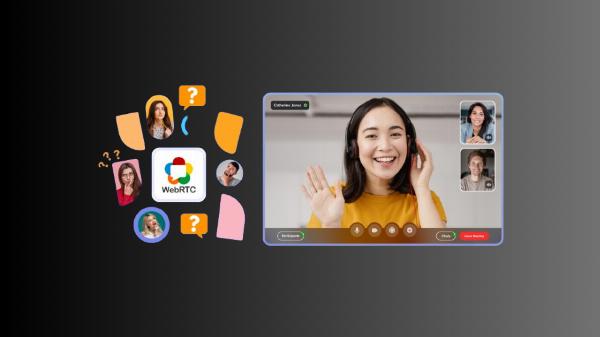An In-Depth Guide to Hire WebRTC Developers

Strong 8k brings an ultra-HD IPTV experience to your living room and your pocket.
In today digital era, WebRTC (Web Real-Time Communication) has revolutionized real-time communication by enabling voice, video, and data sharing directly between browsers without the need for plugins. As businesses increasingly rely on real-time communication to enhance customer experiences and streamline operations, the demand for skilled WebRTC developers is on the rise. This in-depth guide will walk you through the essential steps to hire WebRTC developers, from identifying key skills to evaluating and onboarding candidates.
Understanding WebRTC Technology
Before going into the hiring process, it’s crucial to have a basic understanding of WebRTC technology. WebRTC facilitates peer-to-peer communication directly between web browsers, which makes it ideal for applications such as video conferencing, live streaming, and online gaming. The core components of WebRTC include:
- Media Streams: For capturing and transmitting audio and video.
- Peer-to-Peer Connections: Enabling direct communication between browsers.
- Data Channels: Allowing the transfer of arbitrary data between peers.
Understanding these components will help you identify the necessary skills and expertise required in WebRTC developers.
Key Skills to Look for in WebRTC Developers
When hiring WebRTC developers, focus on candidates who possess a mix of technical skills, practical experience, and problem-solving abilities. Here are the key skills to consider:
1. Proficiency in WebRTC APIs and Protocols
Candidates should be adept at using WebRTC APIs and familiar with essential protocols such as SRTP (Secure Real-Time Transport Protocol), ICE (Interactive Connectivity Establishment), and DTLS (Datagram Transport Layer Security).
2. Strong JavaScript Skills
Since WebRTC is primarily built using JavaScript, developers should have a solid grasp of JavaScript and experience with frameworks like React, Angular, or Vue.js.
3. Backend Development Expertise
Knowledge of backend technologies, particularly Node.js, is crucial for managing signaling servers, user authentication, and data storage.
4. Media Processing Knowledge
Experience with media codecs, media servers, and optimization techniques is essential for delivering high-quality audio and video streams.
5. Network Engineering Skills
Developers should have expertise in network troubleshooting, bandwidth management, and optimizing network performance for seamless communication.
6. Security Best Practices
Given the sensitivity of real-time communication, candidates must prioritize security, including encryption, authentication, and data protection.
Where to Find WebRTC Developers
Finding skilled WebRTC developers requires a multi-faceted approach. Here are some effective strategies:
1. Online Job Portals
Platforms like LinkedIn, Indeed, and Glassdoor are excellent for posting job listings and reaching a wide audience of potential candidates.
2. Freelance Platforms
Websites such as Upwork, Freelancer, and Toptal allow you to hire freelance WebRTC developers for short-term projects or specific tasks.
3. Tech Communities and Forums
Engage with WebRTC-specific communities on platforms like GitHub, Stack Overflow, and WebRTC.org to connect with developers who are passionate about the technology.
4. Networking Events and Conferences
Attend tech conferences, webinars, and networking events focused on WebRTC and real-time communication to meet potential candidates and industry experts.
5. Referrals and Recommendations
Leverage your professional network to get referrals and recommendations. Often, the best candidates come through personal connections.
Evaluating WebRTC Developer Candidates
Evaluation begins once you have a pool of candidates. Here are some steps to help you assess their suitability for your project:
1. Review Portfolios and Projects
Analyze candidates' portfolios and past projects to assess their experience with WebRTC. Look for examples of applications they’ve built and their contributions to open-source projects.
2. Conduct Technical Interviews
Prepare technical questions and coding challenges focused on WebRTC. Assess their problem-solving skills, understanding of WebRTC APIs, and ability to handle real-time communication challenges.
3. Test Practical Skills
Conduct a practical test where candidates build a small WebRTC application or solve a specific problem related to your project. This hands-on approach will give you insight into their coding abilities and creativity.
4. Evaluate Soft Skills
The key to successful collaboration is communication, teamwork, and adaptability. Evaluate candidates’ soft skills through behavioral interviews and situational questions.
5. Check References
Make contact with previous employers or clients to verify a candidate's work experience, reliability, and performance. References provide valuable insights into their professional behavior and work ethic.
Making the Right Offer
After identifying the ideal WebRTC developer, it’s time to make a compelling offer. Consider the following factors:
1. Competitive Salary and Benefits
Research industry standards and offer a competitive salary and benefits package to attract top talent.
2. Clear Job Role and Expectations
Provide a detailed job description outlining the role, responsibilities, and expectations. Clarity in job roles helps avoid misunderstandings and sets the stage for a successful collaboration.
3. Opportunities for Growth
Highlight opportunities for career growth, skill development, and advancement within your organization. Talented developers are often attracted to positions that offer long-term career prospects.
Onboarding and Integration
Successfully integrating new WebRTC developers into your team is crucial for project success. Follow these steps to ensure a smooth onboarding process:
1. Comprehensive Orientation
Provide a thorough orientation that includes an overview of your company, project goals, and team structure.
2. Training and Resources
Offer training sessions and resources to familiarize new developers with your codebase, tools, and workflows. Encourage continuous learning and provide access to relevant documentation and tutorials.
3. Mentorship and Support
Assign a mentor or buddy to guide new hires during their initial weeks. Regular check-ins and feedback sessions help address any challenges and ensure they feel supported.
4. Collaborative Environment
Foster a collaborative and inclusive work environment where new developers feel comfortable sharing ideas and contributing to discussions. Encourage teamwork and open communication.
Also Read: WebRTC Developers: 5 Reasons to Hire Them
Conclusion
Hire WebRTC developers is critical to the success of your WebRTC app development project. By understanding the key skills required, leveraging various hiring channels, and conducting thorough evaluations, you can find and hire top talent. Providing a competitive offer and a smooth onboarding process will further enhance your chances of building a strong development team capable of delivering high-quality real-time communication solutions. Investing time and effort hire WebRTC developers will pay off in the long run, driving your project's success and innovation in the ever-evolving digital landscape.
Note: IndiBlogHub features both user-submitted and editorial content. We do not verify third-party contributions. Read our Disclaimer and Privacy Policyfor details.







